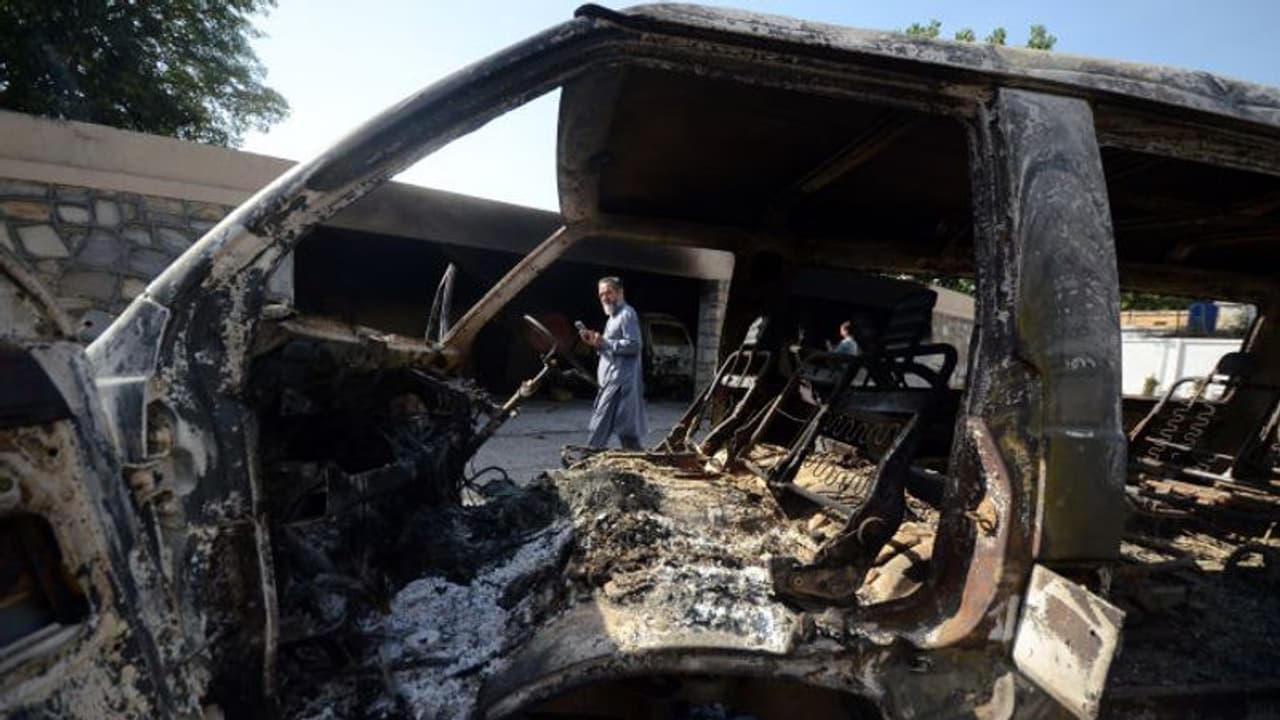A political leader falling out of grace with Pakistan's army is nothing new. What is novel is Imran Khan and his supporters' willingness to take on the army. Girish Linganna explains.
Imran Khan was expecting a routine day in court when he travelled from Lahore to Islamabad on May 9 to appear before the Islamabad High Court. It was not meant to be. Khan was hauled off the court's premises and into an armoured car by paramilitary men, and lodged in the custody of the country's anti-corruption authorities, 13 months after he was deposed as prime minister in a vote of no confidence. Rather than contesting early polls, as he has been asking for months, the unpredictable populist may have to watch national elections later this year unfold from behind bars -- if they are held at all.

Pakistan Crisis: 'Political system has shattered; Pakistanis are struggling'
Khan's arrest is being justified by allegations of wrongdoing in connection with a land deal. (He disputes the allegations.) Nonetheless, his arrest appears to be tied to his developing feud with Pakistan's armed forces.
Khan alleged in a public rally on May 6 that Major General Faisal Naseer, the army's intelligence arm, was preparing his assassination. Khan had previously blamed a failed assassination attempt on his life on Shehbaz Sharif, his successor as Prime Minister, and other senior government and intelligence personnel. He had been shot in the leg.
In a rare public statement, the army's public relations division dubbed Khan's most recent allegations "extremely unfortunate, deplorable, and unacceptable" and threatened legal action. That did not prevent Khan from reiterating them in a video recorded en route to the Islamabad courthouse. He was apprehended shortly thereafter.
The detention is the most recent development in a protracted political and constitutional crisis. Khan has never acknowledged the legitimacy of his dismissal as prime minister a year ago. In an effort to force the government to conduct early national elections, his party, Pakistan Tehreek-e-Insaf (PTI), dissolved two provincial assemblies it controlled in January, including the crucial state of Punjab. But Sharif wants unified elections in all four provinces and the capital in October, following the expiration of parliament's term.
Pakistan deeply divided, unstable... that has implications for India
The crisis became constitutional when the Supreme Court ordered elections in Punjab on 14 May, as requested by Khan, an order which the central government and parliament have rejected.
Sharif and his administration appear eager to purchase time in order to improve the economy before the upcoming elections. In April, the annual inflation rate reached a new high of 36.4%. The current food price inflation rate is 48.1%. This year's GDP growth is projected to be a dismal 0.5%. With an estimated $77.5 billion in loan repayments due by June 2026 and no indication that the IMF will shortly agree to resume a $6.5 billion lending programme, Pakistan remains at risk of default despite China's bilateral assistance.
During a weekend visit to Islamabad, China's foreign minister urged Pakistan to fix its chaotic politics and concentrate on strengthening the economy.
The most imminent threat is the breakdown of law and order. Small demonstrations have already become violent. The most hazardous and unprecedented protests in Pakistan's political history have been directed at military sites. In Lahore, protesters armed with sticks broke into the normally heavily fortified residence of the city's top military commander, smashed windows, set furniture on fire, and stole domestic items.
One protester was seen cradling a peacock. "I took it from the corps commander's house. It is the money of the people. We are reclaiming what they stole," the masked protester declared. In the garrison city of Rawalpindi, protesters were also spotted breaking through the main gate of the army's headquarters.
In Pakistan, where the army is both feared and revered, images of protests against it on social media are a rare and dramatic sight. The government may be attempting to conceal them from the public. Pakistanis across the nation reported disruptions of social media, internet, and mobile phone networks at the time of publication.
A political leader falling out of grace with Pakistan's army is nothing new. What is novel is Khan and his supporters' willingness to take on the army. Sharif and his government may be optimistic about their chances of retaining power as Khan engages in combat with the army. However, Pakistan may be closer to the brink than they realise.
